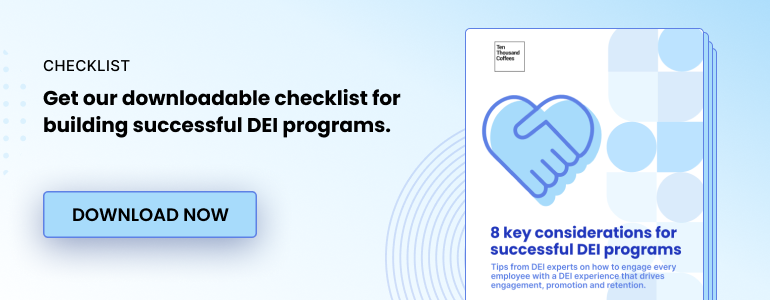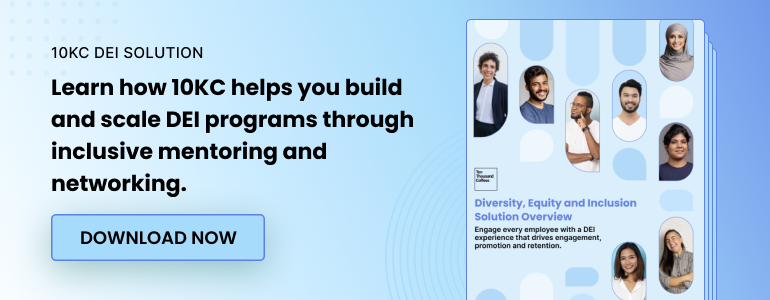For over half of employees (53%), DEI is a key factor when considering an employer.
Yet organizations often struggle to align impact with intention.
If you’re finding that your company falls into this category, you’re not alone. Despite making very public commitments to create more inclusive workplaces, many organizations find making meaningful DEI progress a challenge.
Good news is, there are many ways to get your organization headed in the right direction. (And no, it doesn’t include more DEI training sessions.)
Keep reading as we share 8 actionable tips to help your organization promote DEI in the workplace.
Why promote DEI in the workplace?
Despite diversity, equity, and inclusion (DEI) being at the forefront of the workplace conversation, 75% of employees report that they’ve felt excluded at work. And over half (56%) of employees feel like they can’t share their whole identity at work—this sentiment is even higher among LGBTQ+ workers at 77%.
Taking steps toward improving DEI goes beyond just staying on top of the latest workplace trends. When you actively champion diversity in the workplace, it fosters a sense of belonging among your employees. Over time this can result in significant bottom-line benefits for your business.
Organizations that promote diversity and inclusion in the workplace enjoy:
- 20% higher rate of innovation and 19% higher innovation revenues (BCG)
- 35% more likely to have returns above national industry medians (Fortune)
- 2.3x the cash flow per employee (Josh Bersin)
- 2.6x more likely to increase employee engagement and improve retention. (Josh Bersin)
So how can you promote DEI in the workplace? Identifying a DEI champion is a great place to start.
The role of a DEI champion
A diversity, equity, and inclusion (DEI) champion is an individual—or a department—that advocates for DEI initiatives and action within the organization.
A DEI champion should:
- Encourage the organization to implement best DEI practices.
- Put DEI at the forefront of business conversations.
- Model equitable and inclusive behavior.
- Call out non-inclusive or biased policies and behaviors.
- Speak to employees to understand existing challenges and concerns.
A DEI champion can simply be someone who informally steps into the role by speaking out and promoting DEI actions. These are often employees or ERGs who are passionate about DEI in the workplace.
However, in order to make the biggest impact, the role of DEI champion should go to an individual—or team—whose formal job responsibilities include promoting DEI practices. They typically have the expertise, background, and education to make informed DEI decisions. And when DEI is part of their core job description, it helps ensure they have the resources and influence they need to make an impact.
For example, in larger organizations, a Chief Diversity Officer might fill the role of DEI champion. Or in some instances, the role might belong to the talent or HR department. It’s an important role that keeps executives and the company at large accountable for DEI progress.
“Be really thoughtful about the allies who you'll reach out to, who will be a champion for the activity, and who will really help you – not only to gather mentors, but also those who share this as an imperative and priority.” - Gina Tesla, Vice President, Sustainability, Social Impact, and DEI, Coupa
This is just the beginning, and having a DEI champion is only the first step. You still need to take the right actions to help drive DEI impact within your organization.

8 ways to promote diversity, equity, and inclusion at work
Like most business objectives, reaching your DEI goals doesn’t happen overnight. It takes deliberate and thoughtful action to create meaningful change.
We’ve rounded up a few actionable ways to help boost DEI in the workplace.
1. Integrate diversity and inclusion in the workplace culture
True DEI can’t happen in a silo. When DEI initiatives are treated as a side project, they’re almost guaranteed to fail.
Instead, when diversity initiatives are tied to other high-priority activities and policies, you’re more likely to see a lasting impact.
For example, senior leaders and executives often meet on a regular basis to discuss revenue goals and other company-wide objectives. DEI progress and efforts should be woven into these discussions rather than treated as a separate entity.
When diversity and inclusion issues are discussed at the highest level, it shows everyone that DEI is an organizational priority. It trickles down into day-to-day workplace conversations and activities. Over time, this creates a more inclusive workplace culture—impacting your ability to attract, hire, and retain the best talent.
2. Provide action-oriented learning opportunities
DEI training programs have a time and place. But the reality is that stale training videos only go so far.
Action-oriented DEI initiatives provide employees with the tools they need to improve decision-making and exhibit inclusive behavior. They give individuals the chance to practice responding to sensitive issues in a safe environment. For example, this might include hands-on classes, workshops, or small-form discussion groups.
This human resources trainer sums it up perfectly:
“People learn best when they can experience what they’re being taught. You can’t just hear about it. It has to be modeled and put into context. You have to role play the scenarios and the training has to be interactive for employees to learn the lessons thoroughly. Everyone does better in difficult situations like this if they’ve already practiced what to do in the safety of a training simulation. People need an immersive training experience that puts them in simulated situations that they may face in real life.”
DEI training programs also tend to come with a secondary challenge. They often focus on litigious behaviors and the negative impact of inequitable or non-inclusive behavior.
Sure, we know that lack of DEI comes with consequences. But most employees don’t see themselves as being racist, sexist, ageist, or impacting other people at work. The negativity around DEI training can make employees feel anxious, guilty, or even downright defensive.
Focusing on the positives and the behavioral changes that can make an impact is often much more effective. It encourages employees to be open to identifying their blind spots and shifting their perspectives.
3. Improve diversity initiatives with mentorship
Mentoring programs connect employees with their peers and senior leaders.
Not only does mentorship promote employee career development but it’s closely tied to successful workplace diversity and inclusion outcomes.
- Mentoring creates opportunities for diverse and underrepresented talent. With as many as 80% of jobs being filled through personal connections, diversity mentorship and sponsorship programs open up doors to opportunities for underrepresented talent that may otherwise not be available to them.
- Mentoring boosts representation at the management level: When diverse talent is provided with mentoring opportunities, it can increase representation in managerial roles by up to 24%.
- Mentoring expands employee networks. Mentoring boosts employee visibility and provides equitable access to networking opportunities.
- Mentoring fosters belonging. Mentorship promotes purposeful connections and conversations between employees that can boost belonging.
A great example of DEI success through mentorship is Spring Health. Michelle Rojas, Director of Diversity, Equity, and Inclusion, launched an employee mentorship program because the attrition rate of diverse talent was about 3x the rate of the company overall. With the help of their mentorship program “Sprout with Sprint”, these attrition rates have been cut in half.
“There was a big appetite for this program. I coupled that with our existing attrition of 32% with the fact that I could express, hey, this program right now manually will take x number of hours to run, which would then take away from my capacity to do other high priority DEI initiatives. We need this program, but we also need to invest in a tool that will make this program even more successful and easier to maintain and scale.” - Michelle Rojas, Director of DEI, Spring Health
WATCH NOW: How Spring Health Doubled Retention of Diverse Talent Within a Year

4. Make creating a diverse and inclusive workplace a team effort
Many employees assume that DEI initiatives are geared toward underrepresented groups. This means employees might avoid DEI programs or activities, particularly if they don’t identify as part of those groups.
In some situations, employees may also simply assume that they’re already doing everything they can to be inclusive and skip out on diversity and inclusion programs.
But the reality is that inclusion is a group activity. You can’t be truly inclusive if everyone’s not on board. It’s part of the reason that DEI needs to be ingrained in your workplace culture to be successful.
Leaders and DEI champions should make every effort to clarify that every single employee—regardless of their own background—has an important role to play in creating a diverse, inclusive, equitable workplace.
5. Create room for a multitude of identities
According to the Harvard Business Review, code-switching is the practice of adjusting one’s style of speech, appearance, behavior, and expression in ways that will optimize the comfort of others in exchange for fair treatment, quality service, and employment opportunities.
Throughout history, minorities have been pressured to code-switch to act like the majority of those they work with. This happens for a wide variety of reasons, whether it’s due to a fear of being excluded, being treated differently, or being held back in their careers. Even now, according to a Pew Research study, 48% of those with at least a four-year college degree say they often or sometimes feel the need to code-switch.
Code switching shouldn’t be an expectation or even the norm in the workplace.
“Many corporate environments make minorities feel as though they need to code-switch, shifting the way we present ourselves and the way we interact to make others feel more comfortable, but expecting someone to code-switch does not recognize and support their full multitude of identities.” - David Simmons, Former SVP Communications & Public Affairs at McKesson
By creating space for—and supporting—a multitude of identities in the workplace you eliminate the need for employees to code-switch. It fosters an environment where more employees can show up to work as their true selves.
Leaders can do this by:
- Celebrating who an employee is, rather than expecting them to behave in a certain way.
- Sharing their own vulnerabilities and differences.
- Acknowledging their own differences and similarities to others.
When employees feel like they can come to work authentically, they’re not only happier but are likely to have better performance.
6. Build up employee diversity, equity, and inclusion toolkits
Switching up employee perspectives around DEI can be a challenge. It’s not that employees want to be non-inclusive, but there are a lot of systemic biases and challenges that need to be addressed first.
Giving employees the tools and resources they need can go a long way in promoting equity in the workplace.
For instance, here are some things that have gone into the DEI toolkit at McKesson:
- Create a curriculum. Without a curriculum, leaders are often flying blind when trying to create a more inclusive workplace. It’s essential to give your team a roadmap for creating actionable change.
- Facilitate small forums and discussions. At McKesson, the communications and HR teams have partnered together to create discussions around DEI. Using platforms like 10KC, McKesson leaders have hosted collaborative DEI discussions. For example, one of the presidents hosted 50 colleagues for an intimate conversation about diversity and inclusion. Afterward, she took the feedback and shared it across the business.
- Build a DE&I roadmap focused on impact. If you want to make meaningful change, you need a transparent and measurable plan. You should also provide data on where you are and where you hope to be.
- Tools to promote unbiased networking. Networking is always happening informally in the workplace. But people tend to hang out with people in their immediate network, which is prone to affinity bias. McKesson has also used 10KC to match colleagues for coffee chats based on interests and goals, expanding their networks while still providing value to their career development.
.png)
7. Create goals and measure progress
DEI in the workplace shouldn’t—and doesn’t have to be—wishful thinking. But to get there, you need to set big-picture goals and outline milestones you need to reach along the way. Without a clear path, you may find yourself walking in circles.
For example, common goals for promoting DEI in the workplace include:
- Recruiting and hiring more employees from minority communities.
- Having your employee population mirror the population of your local community.
- Making the environment more inclusive to existing employees and increasing employee retention.
If you don’t know where you’re at today and what you’ll do to get there, how can you expect to make any meaningful progress?
Ultimately, it’s up to your organization to decide what you’ll measure and how often. But doing so is non-negotiable if you want to promote DEI.
Plus, with companies spending as much as $8 billion a year on DEI efforts in the U.S.alone, measuring progress can help validate the ROI on DEI. Metrics make it easy to identify opportunities and successes and communicate them effectively to stakeholders.
8. Collect candid feedback from your team
Here’s the hard truth about DEI: it’s not just about you as an organization. What matters is whether or not your employees feel that you’re making an impact.
And a lot of employees—50% to be exact—want their workplace to do more.
While your employee feedback might not always be good news you’re hoping for, it does help you identify the right areas of improvement. The insights you get from your team can help you to focus on the initiatives that matter most to them.
Employee DEI feedback can be gathered anecdotally or through more formal surveys.
Some examples of questions to ask in a DEI feedback survey include:
- Do you feel comfortable being yourself at work?
- Are there certain aspects of yourself you feel you need to keep separate from work?
- Do you ever feel left out at work?
- What could we do better to support you?
- Have you faced or witnessed prejudice in the workplace setting?
- How do you feel our current EDI initiatives are going? What’s working? Where do we need to improve?
Another formal way to gather employee feedback and sentiment is to conduct a DEI audit.
How technology helps to promote DEI at work
When it comes to DEI, there’s a lot to consider to keep your initiatives equitable and unbiased.
Fortunately, modern organizations can take advantage of a wide range of technology and tools to help make DEI initiatives just a bit easier.
10KC’s inclusive mentoring and networking platform helps:
- Create unbiased matches at scale. Skip the manual matching with 10KC’s Smart-Match algorithm. In just a few clicks, you can automatically match employees based on career goals, shared interests, and differences to facilitate more personalized connections.
- Drive DEI initiatives forward with Office Hours: Go beyond 1:1 interactions and connect employees with busy leaders in a group setting to boost collaboration and employee connectivity.
- Implement curriculums based on your DEI goals. Choose from a pre-built library of templates, including guided curriculums and discussion guides. Or design a custom program tailored to your business needs.
- Automate reporting and data. Ditch the spreadsheets and collect the insights you need to stay on top of your DEI goals with data dashboards that track program activity and adoption in real time.
- Gather employee feedback. Keep a pulse on employee sentiment with anonymous surveys so you can understand how different organization-wide DEI initiatives affect morale.
%25252520copy.png)









.png)